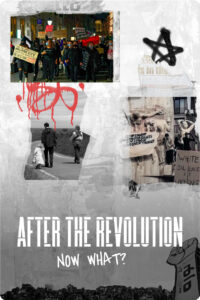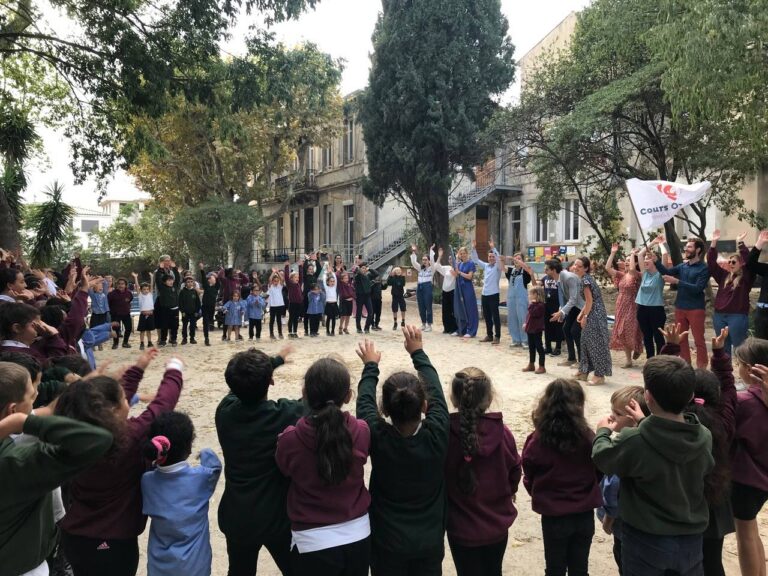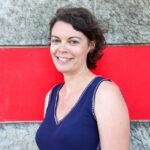“Socrates, beating you’s not a breeze!”, “1, 2, 3, 4, Beethoven here we go!”, “Marie Curie, we all follow your lead!” At the Cours Ozanam, an elementary school for children aged 3 to 10 in northern Marseille, today is a time for celebration. The autumn sun is shining over the few hundred of students gathered in a circle round the teaching staff, with their parents watching from benches. The children are grouped in cross-age teams, under the banner of famous historical figures (from Socrates to Lucie Aubrac and Marco Polo), and one by one they chant their team slogan. It is now Nolan’s turn to come forward, with his mother by his side. As a first-grader, the 6-year-old boy is a new student, and his mother doesn’t hide her joy. “Your parents and I are very proud to give you this uniform,” headmaster Valentin Rebeix says solemnly. Young Nolan blushes, eager to put on the green sweater that every other boy wears at school. Once he has the sweater on, Nolan turns towards his classmates: they do the wave before they all applaud him, looking happy as if it were Christmas Day. Then his team captain, a 5th grade student, comes to take him to his seat: from now on, Nolan officially belongs to the great family of Cours Ozanam.
Founded in 2014, Cours Ozanam is a part of the Espérance Banlieues network. The association comprises 18 non-contract schools (Cours Ozanam included) spread across the French territory, each located in a priority neighborhood. The project stems from a major event: the 2005 French riots in the suburbs, evincing the failure of public policies in these neighborhoods. As a response, in 2010, the mayor of Montfermeil (93) wanted to launch an experimental program to explore alternative solutions in the field of education. Two years later, the Espérance Banlieues foundation was born, with a first school located in Montfermeil and a second in the 13th arrondissement of Marseille.
Beyond learning French, mathematics, or geography, the teachers at Espérance Banlieues are also educators who strive to impart values related to character development
A pedagogy that fosters community life
“We share three fundamental pillars with all the other schools from the network,” explains Valentin Rebeix, head of Cours Ozanam since one year. “To educate, to teach and to anchor.” Indeed the professors of the Espérance Banlieues network do not only teach French, math or geography, they are also educators striving to pass on values related to social skills. “Our pedagogy is based on teaching methods borrowed to Scouting: compulsory uniform, cross-age teams, contribution to chores, mini-camps, and collective games with the staff” the headmaster goes on.
“Here, everyone can be friends with anyone,” claims Soumaya, aged 8, attending the Cours Ozanam for 3 years. 9-year-old Inès agrees: “In my former school, differences were a big deal, like who was less rich than the others… When I got my uniform, it made me happy.” Both girls are members of the same team, named after the 20th century French explorer Anita Conti, and describe how glad they are to help with the chores together, like putting away the tables that are set every day in the courtyard for lunch, or taking care of the chickens, a common interest at the school. “One day, I’d like to be a team captain,” Inès says. Assigned to the older students in 5th grade, this role consists in taking care of the youngest and making sure everyone carries on their mission, just like Emile does, as the captain of the Jeanne d’Arc team: “Gabrielle, you will wipe the table clean, and you, Mehdi, you’ll put away the benches.” Through the square glasses that make him look very grown-up, the schoolboy keeps a close watch on everyone and starts stacking the tables that the other students bring him already folded. “It’s not that I particularly enjoy doing it, but it has to be done so I’m handling it,” the 10-year-old points out wisely.
The banlieue as a place of experimentation and innovation
“The school is a place of life, like a micro-society where we discover and experience human relationships of kindness, fraternity and openness,” continues Valentin Rebeix, “the ambition is to have an impact on the women and men of tomorrow. This educational project, designed exclusively to be rooted in difficult neighborhoods, aims to be a laboratory: “like Maria Montessori who developed her pedagogy within a Children’s House in a working-class neighborhood of Rome, the suburbs is the place of innovation that we can then share externally,” analyzes the thirty-year-old from Marseille.
Developing a specificity of its own, Cours Ozanam pursues two main ambitions: “to prevent and combat communitarianism, as well as children dropping out of school.” The school is actually the one where social diversity is the strongest compared to the rest of the Espérance Banlieues network: one in two pupils comes from a priority neighborhood, especially from la Cité des Lauriers, “one of the ten most difficult in France,” Valentin points out. Medhi, Elyes and Besma therefore interact with Côme, Salomé or Timéo on a daily basis.
Providing parenthood support and an opening on the neighborhood
“Being able to provide children with a real social diversity and community life is such a great opportunity,” Blanche-Astrid notices. She is a mother of three, with two children of school age who both attend Cours Ozanam. She came to witness her five-year-old son Camille receive his uniform, and she appreciates this “privileged environment”: no more than 15 students per class, teachers who are very much involved, and “freedom for all to live their religion as something they can talk about, not a taboo.” Not far from her, another mother is sat on a bench talking with other parents. “No doubt about it: it is the best school of Marseille,” claims Farida, a stay-at-home mom. “We live in the 10th arrondissement, it takes us 45 minutes to get here, but it’s worth the ride.” And yet, she had put her two daughters in private preschool and elementary school. But here, she says, “we can communicate with both professors and other parents.”
The school is a place of life, like a micro-society where one discovers and experiences human relationships of kindness, fraternity, and openness
Valentin Rebeix, director at Cours Ozanam
Since it opened in 2014, Cours Ozanam chose to develop another project in parallel to the school, dedicated to supporting parents: the staff paying the families’ homes a visit, workshops (to train in homework support, screen time management, family games, nutrition) and weekly coffee-meetings for parents. “I’m going every week,” Farida says, “you can ask as many questions as you want and we give each other tips for handling homework.” “I attend the coffee meetings from time to time, to share the struggles and joys of other parents,” Blanche-Astrid explains. “It helps me to really experience different perspectives and open myself to the neighborhood.” In keeping with their view of school being a micro-society, Cours Ozanam also builds partnerships with company directors, the nearby retirement home, and neighborhood associations. Farida was able to attend a workshop of professional reintegration with one of the associations, “Massajobs”. “Overall, it’s very positive,” she concludes.
A non-contract system: fragile but relying on solidarity
At the beginning however, Farida was confused by the “Ozanam approach”: “We had a lot of questions about how it worked, attending a non-contract school,” she recalls. Starting with tuition fees, which, albeit being adjusted according to the families’ income, still costs an average of 60€ per student each month. “These fees only covers up to 10% of the overall operating costs,” Valentin Rebeix says. Despite being hesitant at first, Farida eventually made up her mind: “For my daughters’ sake, I’d rather pay.”
To cover the annual budget, the school notably uses subsidies from the City of Marseille and the Department of Bouches-du-Rhône, even if “80% of our funds come from donations from companies or individuals,” continues the director. An operation that turns out to be double-edged: “it’s a driver of solidarity but it’s also a source of stress every year.”
Beyond the financial aspect, certain controversies have been heard at the political level: several investigations have revealed links between the Espérance Banlieues network and conservative circles. Its founder, Eric Mestrallet, was close to the Movement for France of Philippe de Villiers. The network was also initially affiliated with the Fondation pour l’Ecole, linked to La Manif pour Tous and the anti-abortion Jérôme Lejeune Foundation. Since 2019, Espérance Banlieues has freed itself from this structure and now operates under the aegis of the Fondation de France.
Help us tell the world to you !
Frictions is launching its club : by supporting Frictions, you’ll be supporting a community of authors and journalists who tell the world through intimate stories!

Learning lasting social skills
“What stuck with me the most? Being encouraged to get personally involved,” says Antoine, a 15-year-old junior student now attending an affluent high school in downtown Marseille. The “alumni reunion” the school organized this year has him come back to the place where he grew up. “Here, I learned to do things by myself. That’s why I’m playing an active part in my high school: I ran for Student Council and for the school board.” Roya, an 11-year-old former student who started 6th grade in a nearby private middle school, emphasizes how “peculiar” it felt to “go from 13 to 29 students per class.”
Among the 70 young people that now form Cours Ozanam’s alumni, “100% got to pick the middle school they wanted to attend, and 90% went to a private school. We celebrate it as a success, for they are now on track,” says the headmaster, who takes his jacket off to go and play dodge-ball with his former students. Before he joins them, Roya adds: “Cours Ozanam taught me to socialize with everyone, no matter their age or culture. Here, team spirit is key!”









